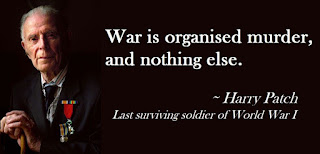NOTE: I wrote this back in 2015, but this year, the 100th memorial year, I think is a good time to give it another airing.
A Legacy from the Great War. (WW1)
I was watching a television trailer, regarding a forthcoming documentary, examining the life of those who lived and fought from the trenches. I was struck by the number of film clips taken on the front line.
That so many have survived for the past one hundred years is quite amazing, considering the ease of degradation of the materials used. I had not previously considered such an archive of moving images existed, considering movie making was still in its infancy at the time.
Seeing these short monochrome (mostly, although a few colour films were produced), films of men going about their daily lives on the front line, brought the characters of those captured on cellulose to life in a way I did not think possible. In conjunction with this footage was often clear and exceptional commentary.
Several factors emerged of which I was unaware, such as staging football tournaments between the various regiments and the front-line horticultural competitions, for growing vegetables and flowers, which, it is said, were passionately contested.
I came to the conclusion, one of which I am certain I was aware of, but not given conscious consideration before, it is… this was the first time we have a recorded and documented history on such a massive scale, yet with meticulous and comprehensive detail covering every aspect of human life during the events.
Further, is the fact this information was collected and collated by individuals as well as all the various states and nations involved, giving us the data we need to conclude a balanced and unbiased account of the true circumstances and conditions of life during the conflicts, whether at sea, in the air, or indeed on the Western front.
Never before in mankind's history have we collected so much indisputable evidence of a historic event, even one of this magnitude. Additionally, this is the first time we, the general public, can see, hear, even feel (to some extent), the character of the ordinary people entangled in the War.
The events of this 'great war' are now ‘beyond living memory’. All those who participated have died. Which means we must learn and teach our young, from the footage, the photography, the written and recorded archives which exist.
Hopefully, this information will one day be part of the lesson which teaches us all war has no victors and no winners, ever.
A list of the last surviving World War I veterans, listed by country.
The last combat veteran was Claude Choules who served in the British Royal Navy (and later the Royal Australian Navy) and died 5 May 2011, aged 110.
The last veteran who served in the trenches was Harry Patch (British Army) who died on 25 July 2009, aged 111.
The last Central Powers veteran, Franz Künstler of Austria-Hungary, died on 27 May 2008 at the age of 107.
We shall remember them all.
The scary thing is, it makes you realise how close fortune and fate are to brushing against your own life.
A hairsbreadth.
Paul.








Comments
Post a Comment